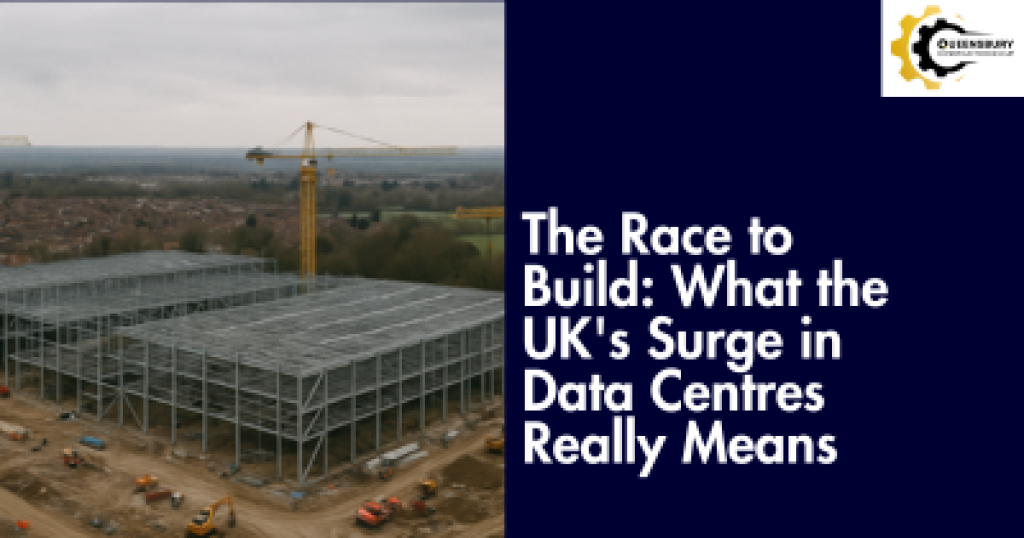Insights

What the UK's Surge in Data Centres Really Means
In a quiet corner of Hertfordshire, residents have found themselves facing a future they hadn't expected. The proposed site for a new AI data centre, project worth billions, sits on greenbelt land many consider untouchable. To them, it's more than just development. It's personal.
They're not alone.
Across the UK, a major shift is taking place. Planning documents reveal that nearly 100 new data centres are expected to appear over the next five years. That's on top of the 477 already in operation. From Slough to South Wales, from Leeds to Blyth, the nation is preparing for a digital future built on artificial intelligence.
But with that future comes friction.
Behind the headlines of tech growth and foreign investment lies a complex set of trade-offs, some of which are already playing out in public view.
The government has made its stance clear: data centres are part of the country's long-term economic strategy. They've been classified as critical infrastructure. In some cases, ministers have overridden local objections to push developments through.
While central investment continues to pour into Google, Microsoft, and Blackstone among the key players, communities are asking difficult questions. Where will the water come from? How will this affect energy bills? What happens to the green spaces that are now under threat?
These aren't theoretical problems. In Ireland, a similar boom led to a temporary ban on new data centres after they consumed one-fifth of the national electricity supply. Meanwhile, in North Lincolnshire, Anglian Water recently objected to another large-scale development, flagging the strain it would place on the region's water reserves.
We can help you assess energy, location, and delivery risks early, before they affect your budget or schedule. Planning a new data centre build?
The Infrastructure Burden
While technology providers make commitments around dry cooling and renewable energy, the facts remain: data centres use a lot of power, and in many cases, a lot of water.
Operators know this, of course. Industry groups are speaking openly about the need for long-term solutions. Ten new reservoirs are now in planning across the Midlands and the Southeast. An AI Energy Council has been set up to address the growing demand.
Yet, while the future is being planned, the present requires action.
Our experts work alongside developers, investors, and local authorities to keep projects on track. Unsure how to manage growing infrastructure demands?
How DCP Supports the Shift
At DCP, we're working with clients to make this transition smoother and more responsible.
Our role in the sector isn't just about getting facilities built, it's about making sure those builds are managed well. That includes:
- Planning and overseeing project timelines with care and clarity.
- Working alongside utility providers to help clients assess long-term energy and water needs before ground is even broken.
- Advising on site selection, regulatory processes, and operational planning that takes community impact into account.
- Supporting mechanical and electrical infrastructure design that meets both performance and sustainability goals.
We've seen what happens when these steps are skipped or rushed. Delays grow longer. Costs spiral. Trust erodes. Our approach is to reduce that risk through early involvement, structured planning, and clear communication.
In short, we help data centre projects stay on course without compromising quality or community relationships.
Interested in working together?
Whether you're a tech provider, a property group, or a local authority partner, our team is here to support your next data centre project from planning to handover.
Get in touch to find out how we can help manage your project needs from day one.
Visit www.dcp-ltd.com or book a call today.

2 Comments
David Shon
Nam vel lacus eu nisl bibendum accumsan vitae vitae nibh. Nam nec eros id magna hendrerit sagittis. Nullam sed mi non odio feugiat volutpat sit amet nec elit.
Jhon Watchson
Nam vel lacus eu nisl bibendum accumsan vitae vitae nibh. Nam nec eros id magna hendrerit sagittis. Nullam sed mi non odio feugiat volutpat sit amet nec elit.